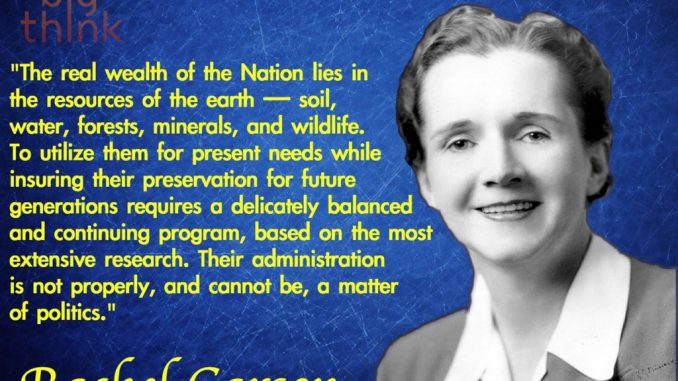
While April is Earth Month, March is Women’s History Month, so we believe that it’s more than appropriate to shed the spotlight on five incredible women who are working to protect the environment.
Rachel Carson (1907 – 1964)
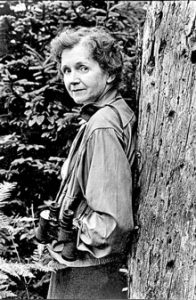
American marine biologist Rachel Carson called attention to the dangers of indiscriminate use of synthetic pesticides while also helping to launch the modern environmental movement through the publication of Silent Spring in 1962, which is considered one of the twentieth century’s most influential works of non-fiction.
While Carson began her career in the U.S. Fish and Wildlife Service, however when her writing became extremely popular, she began writing about science full time. Her writing fueled public interest in a variety of environmental and public health issues and within years after the publishing of her book, the Nixon Administration formed the Environmental Protection Agency.
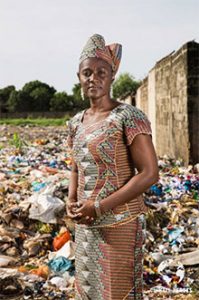 Isatou Ceesay (b. 1972)
Isatou Ceesay (b. 1972)
Born and raised in Gambia, Isatou, Ceesay was forced to drop out of school at a very young age. Regardless of the lack of education, she was able to receive, Ceesay was still very much aware of the negative environmental changes taking place around her. Ceesay noticed all of the plastic bags in her town that were gathering trash, injuring animals and plants, etc. The thought of the woven baskets her community uses came to the mind of Ceesay, and an idea was formed.
In 1997, Ceesay founded the Njau Recycling and Income Generation Group, which is a community recycling initiative that allows women to collect recyclable materials found around the area, bring them to a center and turn the wasteful and harmful materials into items such as purses, bags, etc. Ceesay is known as the “Queen of Recycling in The Gambia” and not only is she working to save the environment, she has also allowed over 100 women to gain income from her recycling effort. Check out her program at OnePlasticBag.com.
Wangari Maathai (1940 – 2011)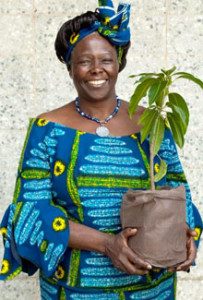
After being one of 300 Kenyan women to be given the opportunity to attend university in the United States for the Airlift Africa program in 1960, Maathai was able to complete her master’s degree in biology. Following the completion of her degree, Maathai returned to Kenya with a brand new perspective regarding the environment.
Maathai founded the Green Belt Movement to teach Kenyan women the art of planting new trees in areas where deforestation was a problem. The new trees being planted not only help the environment, but also bring in income. Since Maathai’s movement was created, 30,000 women have risen from poverty and the movement has also planted over 51 million trees. Maathai received the Nobel Peace Prize in 2004 and was the first African woman to ever receive the award.
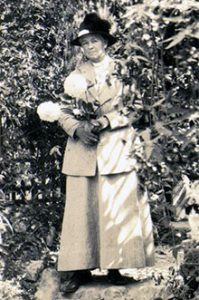 Kate Sessions (1857 – 1940)
Kate Sessions (1857 – 1940)
Being environmentally friendly doesn’t just mean protecting natural spaces. Being environmentally friendly also means thinking of new ways to create green spaces in the areas we live in. Sessions grew up and spent most of her time in northern California with very tall trees! In 1881, she became the first woman to graduate from the University of California with a science degree.
Shortly after graduating, she moved to San Diego, a very dry city at the time with almost no plants. In 1885, Sessions arranged a lease of 30 acres of land in City Park, now known as Balboa Park, from the city in exchange for planting 100 trees a year in the park, and 300 trees a year in the rest of San Diego. Sessions is known as “the Mother of Balboa Park,” and her parks are still alive and flourishing throughout the city today.
Marjory Stoneman Douglas (1890 – 1998)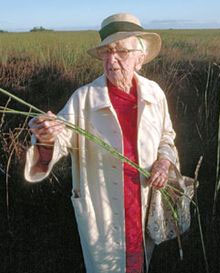
For years, the Everglades were considered a swap of no worth. However, when Douglas moved to Miami, Florida as a young woman, she saw something different– beautiful, growing ecosystems that were all in need of help and all worthy of our attention and protection. Along with that, the Everglades also provided Florida with most of its clean water.
“There are no other Everglades in the world,” she wrote in her 1947 book The Everglades: River of Grass, a book that has been compared to Rachel Carson’s book Silent Spring for its impact on our popular opinions of the environment. Douglas worked as an activist to save the Everglades and to educate people on the Everglades as well. Florida’s Governor Lawton Chiles said, “[Marjory] was not just a pioneer of the environmental movement, she was a prophet, calling out to us to save the environment for our children and our grandchildren.” People believe that if it weren’t for Douglas’ activism, The Everglades would have died.
While these are only five women who have made a serious impact on the world and the environment, the list goes on. This #WomensHistoryMonth, let’s focus on celebrating the women who are helping the environment and working every single day to make the planet a better place!

Leave a Reply
You must be logged in to post a comment.